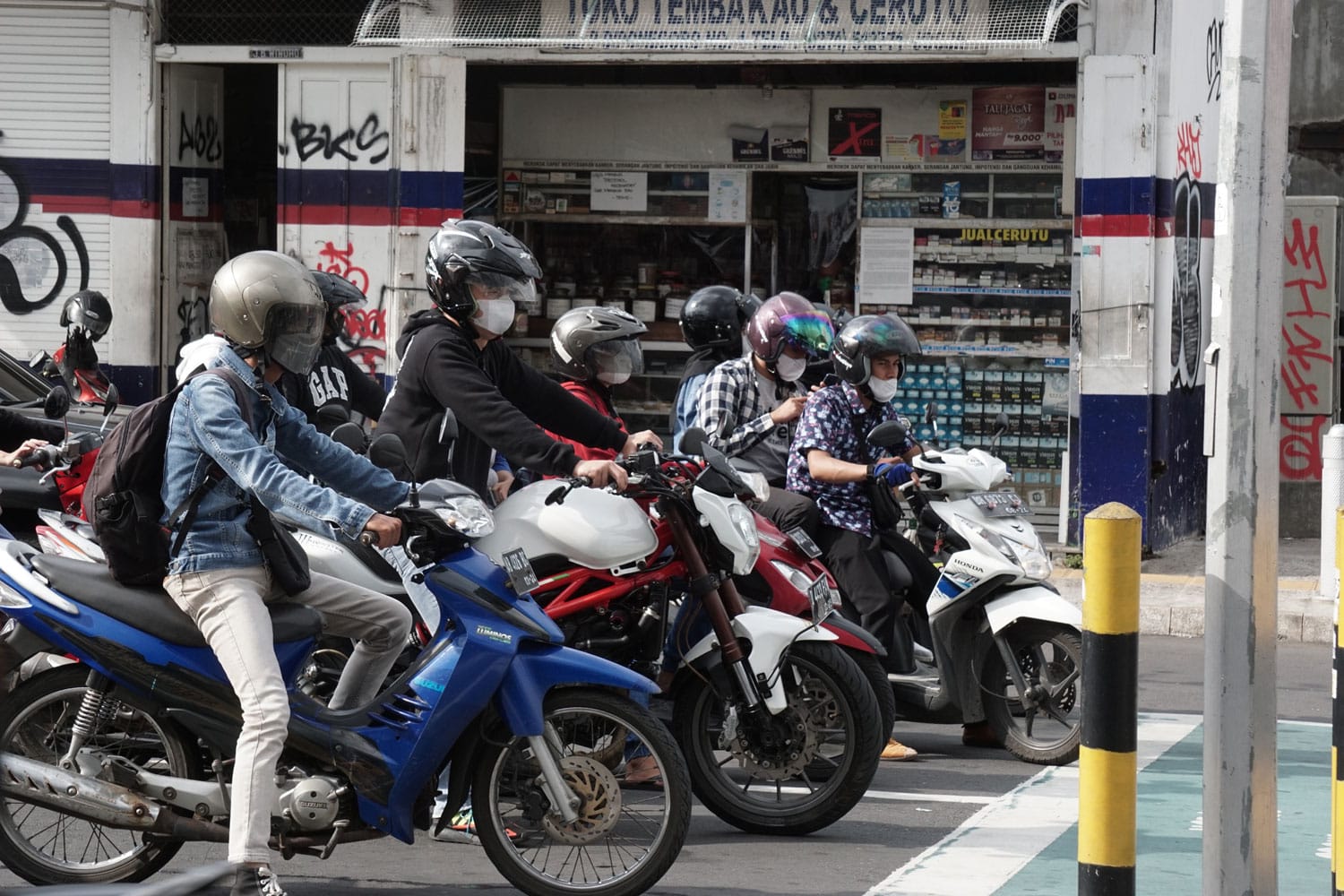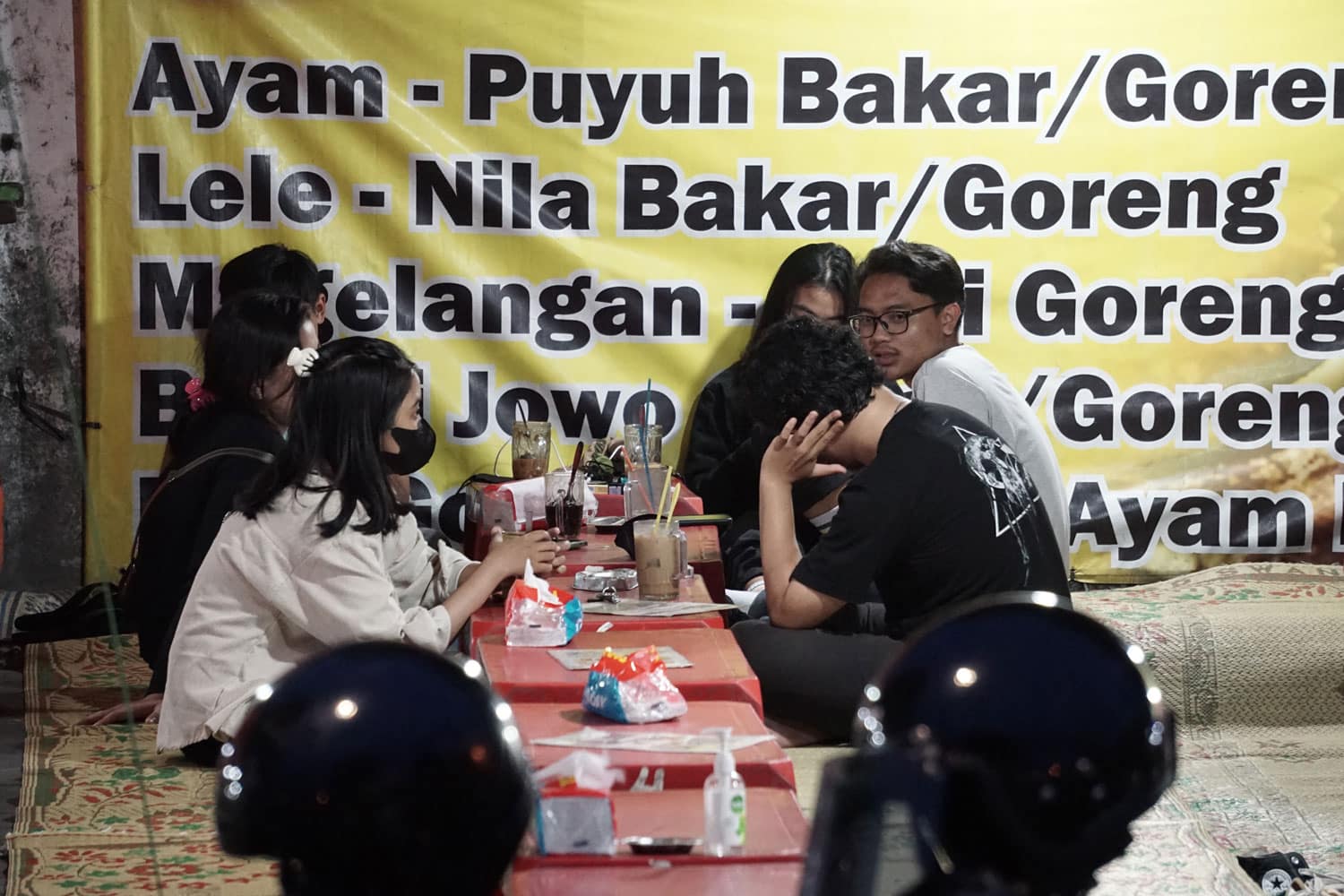Yogyakarta: Minimum Wage, Maximum Toil
Agus Setiawan for This Is Southeast Asia
The city of Yogyakarta | 3000 words | Translated from Bahasa Indonesia by Mikael Johani
The sun was out that Thursday morning. My husband Rio took me for breakfast at a cafe called Not-Civet Coffee in Kaliurang, at the foot of Mount Merapi, well away from the city center. When we got there we were greeted by a mashup of keroncong and bossanova blaring from loudspeakers. The building was in the vintage style, very a la mode — with an open joglo-style dining room from where we could watch the cooks prepare the food on woodfired stoves. We chose to sit in a hut out the back, nestled under tall trees. A short distance away, a group of bicycle riders tried to cool themselves under the thatched roof.
I walked into the open kitchen. Home-cooked dishes were spread out on a long table, buffet-style. I grabbed a plate of rice, still hot, battered curried fish, fried tempe, and some sweet-and-sour soup. Rio, as was his wont, chose the smoked catfish curry. The aroma of the yellow curry was out of this world. We also ordered two pieces of bikang cakes, flavoured with jackfruit, for dessert.
Once we were done with breakfast, we opened our laptops and immersed ourselves in our work. That was at about 10 a.m. By the time we finished, it was 3 p.m.
You can find plenty of people like us in Yogya — urban precariats who are supposed to be able to work anywhere, anytime. But this town deceives. One moment you feel like you’re sleeping in a hammock on a secluded beach. The next you find yourself flat on your face after an especially bad nightmare.
***
I’ve spent a total of eleven years in this city but sometimes I still feel like an outsider. Yogyakarta’s nicknames are the ‘city of education’ — it practically bursts at the seams with a total of, by my last count, 136 universities — and the ‘city of culture’, with a real functioning royal palace that sticks rigidly to its Javanese rituals and traditions. I moved here for the first time as a freshman at Gadjah Mada University, the oldest university in Indonesia. The second time, two years after I graduated and moved back to my hometown in Sidoarjo, East Java — a six-hour drive from Yogya — was when I decided to take a job here at a media monitoring company.
As for many young people who move here to study, Yogya offered me room to grow. It offered comfort. It has played a crucial role in my life.

Many Indonesians are crazy about Yogya. True, the city doesn’t make you fall head over heels, not like Bali. But for many tourists, the culture, the sights — and the food! — just feel more authentic in Yogya. The city is redolent with traditional Javanese culture, you can find traces of it on practically every corner. For outsiders, especially students, its relative quiet offers the perfect place to study, hang out, and make friends. Or so I believed at first. I had dreamt of moving to Yogya for college since I was in junior high. The idea was purely mine, no one had planted it in my head, not even my parents. One day I found a series of short biographies of famous writers in the library of my Islamic boarding school. The books said many of those writers had lived in Yogya. This is the city to live in, and live for, if you dream of becoming a writer, I thought. Since I counted myself as one of those, my mind was made up.
Some dreams do come true. Mine took 14 years. After a lot of struggle, I finally managed to complete my first book of short stories, Time To Not Get Married, and published it with a small press in Yogya.
The launch party for the book was a heartwarming affair. It was held at a coffee shop, filled to the brim with like-minded friends and fellow writers. I didn’t even bother to send invites, people came of their own accord to show their appreciation and support for a beginning author, me. It was a small, unassuming party that soon turned into an impromptu reunion of many friends that I knew through Yogya’s extensive cultural network. Artists, writers, critics, activists, feminists, all the creative types. The publisher served fritters and hot teas. Some people ordered meals and coffee from the cafe. I made sure I went to every table to greet people after the discussion. Everyone congratulated me and asked me to sign my book. That night, I felt like I was finally getting married: to the real me.
One of my friends asked me how I’d chosen the catchy, if not a bit snide, title of my book. I answered, ‘I’m just in it for the money, baby.’ Then we both laughed. We knew it would be a miracle, especially in Yogya, for an indie writer like me to make any sort of money from their first book.
Nowadays I earn my money as a freelance writer and editor. My husband and I live in a rented house not far from Jalan Kaliurang, one of the city’s main arteries. It’s a two-bedroom with quite spacious front and back yards. And most importantly for us, excellent ventilation. It’s also quiet, located fairly far away from the main road. Our house is part of a cluster of dwellings next to a village, surrounded by paddy fields. There are plenty of bike routes. And barely any air or noise pollution — a veritable luxury for people like us who have spent most of our lives living in dirty cities.
But there’s a catch: rising rents. Even though our home is located quite far from any university campus (guaranteed to drive prices up), the rent is still Rp 1.25 million (USD 87) per month. Rents are rising all over the city since investors are buying up properties and turning them into apartments or high-end rented rooms (‘kost’) for students with rich parents from out of town.
In Yogya, you hear progressive ideas everywhere: you hear them when you’re out in cafes with your friends, you hear them in peoples’ homes. ‘Should we create a co-op to counter corporate media?’ ‘What if we open up a coffee shop where people can have deep and meaningful public discussions?’ ‘Do you think it’s possible to live in a commune instead of wasting all our money on a mortgage?’
Meanwhile, the minimum wage in Yogya in 2022 is a sorry Rp 1.84 million. Anyone earning that amount will be hard pressed to find comfortable accommodation. Yogya might be famous as a haven for tourists and students, but it’s also legendary for its extremely low minimum wage, even compared to other less high-profile regions in Indonesia.
One day, while I was paying for my train ticket back to Yogya at a minimarket in Sidoarjo, my hometown, the cashier even threw shade at me about this issue.
‘Are you working or studying in Yogya?’ she asked as she handed back my ID card and receipt.
‘Working’.
Her expression changed immediately from cheery to flabbergasted. ‘Are you serious? Wages there are so low!’
I was almost offended by the young woman’s barely disguised contempt for my situation. But she was right. The struggle is real. I even lied to my mother about my real salary when I was working as a media analyst in Yogya. ‘Even a factory worker who only finished high school earns more than you! And you have a degree from a prestigious university!’ I would bolt straight out the door at that sort of comment.
My friend Prima, who works as an editor at a media company in Yogya, once researched what kind of life was possible for someone earning a minimum wage in Sleman, one of the richest districts in Yogya. According to her calculation, they would never be able to afford a Netflix subscription, buy birthday gifts, or even hang out at cafes. They’d have no money left after rent and food to make a crowdfunding donation. Forget about going to the dentist, updating their glasses prescription, or buying a new laptop.
People often ask me why the minimum wage in Yogya is so low. The answer is simple: workers in the city are not unionized, mostly because not many of them earn their money from the manufacturing industry. Residents of Yogya are in a double bind: wages are low, but expenses are high since almost everything in the city is geared to serve the expensive lifestyles of university students with deep pockets and tourists.
So what makes me, and many other so-called ‘migrants’ in Yogya, stay?
For me, it’s the city’s ambience and sense of community. I can find many things to entertain me in this city, and many places that allow me to relax and forget about the hustle culture, and this suits me just fine — even when they sometimes cost me an arm and a leg.
A case in point: in late afternoons, whenever I feel like reading a new novel and breathing fresh air, I’ll go to Omah Jamu, a cafe famous for its delicious herbal drinks mixed from turmeric, ginger, and other spices. The owner, Jeng Ratu, will quiz customers if they’ve been suffering from minor ailments and then make her own herbal mixes to cure them. Lately, I’ve been taking my friend Marja for breakfast there. We’ll walk to the cafe, a mere 2000 healthy steps from my house, order two glasses of Jeng Ratu’s herbal cocktails (one to cure stiffness for me and one for Marja’s acid reflux) and two plates of rice with tempe and veggies.
Another place that I rely on to cure my urban ailments is the Amazing Point of Balance Clinic, where I regularly meet Lisa, a clinical psychologist who practices kinesiology in her counseling and therapy. The first time I met her, I thought she was a bhikkunī. Her calm demeanour instantly puts me at ease. She combines all sorts of methods in her healing practice: tarot card reading, colour therapy, sound therapy, aromatherapy, crystals, and meditation. Other psychologists would spend most of their time listening to your life stories, but Lisa is different. She focuses on healing parts of your body that hold your pains and traumas. Her inventive method comes with a price tag, although the clinic does let you customize the treatment according to your needs (and pocket).
I often hear friends and strangers say that the goal for a resident of Yogya is to ‘earn a Jakarta wage and spend it in Yogya.’ I’ve got to admit that’s been a huge challenge for me. When I was a student at university, it was all well and fine to romanticize the sense of community you can easily find in Yogya, be it in the activist circle, the art circle, or the intellectual circle. But once you graduate, those communities can become a lifesaver. Your circles of friends, your communities, provide the networks you need to survive as a member of the urban precariat. We, creative types who move from one contract job to another, eternal temps and freelancers, often make a pun out of Yogya’s official motto “Berhati Nyaman” (Peace in Our Heart). For many of us, what Yogya actually gives is “Bertubuh Rentan” (Fragility Everywhere Else). At least we can count on these communities to make our lives more bearable, if not quite enough to make us feel secure.
Recently, a friend said: ‘I want to build a women’s shelter for sexual violence victims. Not just a temporary safe space, but also a counseling centre. We can archive their stories and keep them as collective knowledge. I want to build a network between different sexual violence advocacy groups.’ I wasn’t at all surprised to hear the thinking out loud of progressive ideas by someone busy mashing chilies in a mortar.
In Yogya, you hear ideas like this everywhere: you hear them when you’re out in cafes with your friends, you hear them in peoples’ homes. ‘Should we create a co-op to counter corporate media?’ ‘How’s this for a business idea: sell books on social media, then when we accumulate enough capital open up our own brick-and-mortar, then organize a festival, or even set up our own publishing house?’ ‘What about a workshop where we can teach creative writing in cafes with our friends?’ ‘What if we open up a coffee shop where people can have deep and meaningful public discussions?’ ‘Do you think it’s possible to live in a commune instead of wasting all our money on a mortgage?’
Yogya’s collective spirit has had an overwhelmingly positive effect on me. A long time ago, before I discovered the cultural and intellectual communities that now nourish my spirit, I was left dumbfounded when I met an old man who had retired from a prestigious media company in Jakarta to spend his time alone in a wooden house surrounded by tree seedlings that he kept for conservation. Any visitor to his home could take one for free. Students thronged to his house to help the old man — his name was Lintang Panglipuran — take care of his little garden. What made his conservation idea bloom, I later concluded, was the collective spirit driven by this retiree’s vision and idealism. Failure wasn’t an option for him. I’ve met many dreamers like him in Yogya, people who choose and are determined to break the mold.

Lately, I’ve been volunteering in a collective whose members go around the city on weekends to gather used wedding bouquets and wedding party flower arrangements. The women in this collective are flower lovers; they think it’s a waste that flowers used to decorate wedding halls are invariably thrown away by the organizers once the party is over. I find this relatively simple form of activism intriguing, especially since many progressive ideas my friends come up with can seem overwhelming. Gathering up used flowers at wedding parties then rearranging them in vases for people’s homes is much less exhausting.
***
Saturday night in Kotabaru, a leafy old district of Yogyakarta. The night was hot, even though puddles dotted the streets from a passing rain. But the atmosphere was about to get even hotter. Hundreds of angry delivery drivers were protesting in front of Mie Gacoan, a restaurant famous for its cheap and super-spicy noodles. They had come in droves in support of a fellow delivery driver who a few hours ago had got into a fight with the restaurant staff. The fight started when a customer at the store jumped the queue and then the delivery driver had his order canceled because his customer had waited too long. The driver got angry, swore at the restaurant staff who did nothing to prevent people cutting into line, and kicked over some chairs. The staff retaliated and fought off the irate driver. A video of the fight was posted online and went viral, prompting other delivery drivers to come to the restaurant to protest. They were angry; emotions were running high.
When this incident happened, I was having coffee at a fancy cafe with Ines, an old friend from my college days. She now works as a copywriter for an e-commerce giant in Jakarta. Ines often complains to me about her colleagues’ lifestyles — their penchant for designer labels and their worship of fast fashion and beauty. She longs for her old life in Yogya which she claims was simpler, the people warmer, all around a healthier place to live in. But on the other hand, she still can’t bring herself yet to quit her high-paying Jakarta job and come back to Yogya, her hometown.
‘I won’t be able to buy cute stuff I like or donate to the poor if I work in Yogya. This place has the second lowest minimum wage in Indonesia,’ she said while sipping her cappuccino.
‘Yeah, the price of your cappuccino is even more inhuman than what a pretzel costs in Berlin,’ I said bitterly.
Ines and I were both aware that most cafes in Yogya, from fancy franchises to more spartan ones, actually paid their baristas below minimum wage. I know some who are paid Rp 6000 (40 American cents) an hour.
Ines told me that since she started working from home during the pandemic back at her parents’ house in Yogya, she’d found out that the paddy fields owned collectively by her village (which functioned in lieu of petty cash) had been repurposed into a row of shops and cafes. Local farmers who used to rent the land, and contract farmers who used to work the fields, were helpless to stop the village administrators from selling out.
We were reminded of the farmers in Kulonprogo who fought hard, and lost, against the provincial government’s decision to turn their coastal land into a new international airport. They were driven from their homes, helpless against the desire of the real rulers of Yogya — the sultan and his family — to build Yogya according to their wishes and financial calculations. They’ve even fenced off the old town square in front of their palace just so it can earn heritage status from UNESCO, not giving a fig about ordinary Yogya people who can no longer access it.
Ines and I left the cafe. People were still milling about Mie Gacoan: we watched the event unfold on Twitter. Delivery drivers in Yogya are generally friendly, patient, and polite, but this night they exploded. It wasn’t just solidarity for a fellow driver slighted by the restaurant staff, but pent-up anger at the increasingly exploitative gig economy.
After seeing clips of the incident and people’s comments on Twitter, Ines concluded that the fault lay with the restaurant manager and the delivery app, both of whom maneuvered to disadvantage the delivery drivers. Both the drivers and the restaurant staff were victims, Ines said. They were already at breaking point from earning such low wages while having to work so hard. Nevertheless, Ines couldn’t help but chuckle at some of the insults hurled by the drivers at the restaurant staff: ‘Your noodles give me diarrhoea!’ ‘Your dumplings suck!’ ‘LOL, Yogya people, they can still be funny even when they’re angry,’ she said.
I checked my Twitter feed again when I was back at home. I sighed as I read a long thread on the terrible conditions of the Yogya gig economy by a researcher on workers’ rights. According to the thread, public transportation in the city is in such a terrible state that Yogya has become a gold mine for ride-hailing companies Gojek and Grab. The problem is that their drivers — or ‘partners’, as the unicorn companies like to call them — are only paid Rp 6400 (45 American cents) per four kilometers.
As someone who identifies as a fellow member of the precariat, I feel like I understand how hard it is to try to survive in a system that doesn’t care for the welfare of its workers, such as those delivery drivers. I’ve been working in the publishing industry in Yogya — which most people mistakenly think is thriving — as a freelance editor since 2017 and my fees have never increased a cent.
Supposedly the name Yogyakarta comes from an amalgam of two words — Yogya, ‘good’ or ‘fitting’; and Karta, ‘safe’ or ‘prosperous’. For the thousands of transient tourists and students in the city, the meanings of those words might resonate. Many of them are impressed by the city’s ambience and the friendliness of its citizens. But for permanent residents, both locals and long-term outsiders like me, who struggle to survive day-to-day, Yogya offers neither ‘good’ nor ‘fitting’ wages, let alone ‘safety’ and ‘prosperity’. Yogyakartans need a strong resolve to survive, and even then there’s no guarantee you’ll make it. It is these people — including me — who will continue to have our grit and patience tested in the years ahead, as we scrounge around for happiness in a city that seems to offer only an illusory comfort.
© Amanatia Junda
English translation © Mikael Johani






